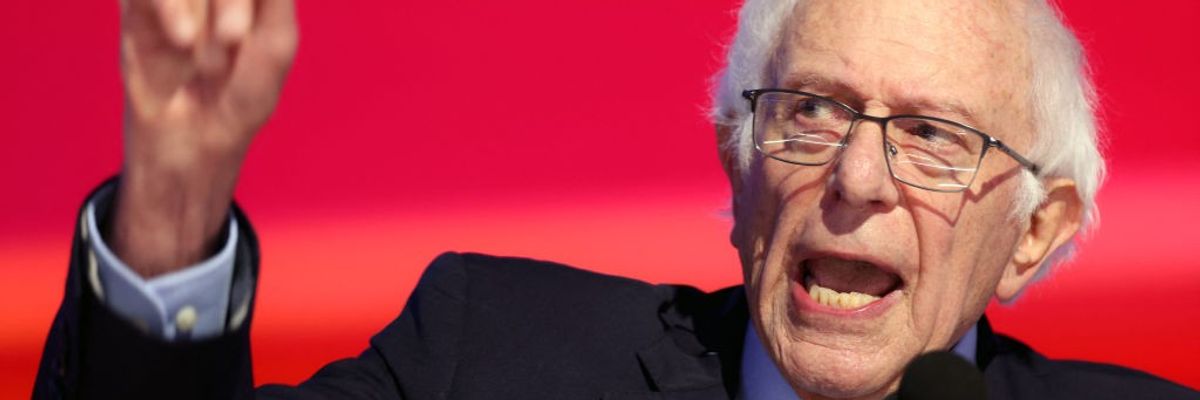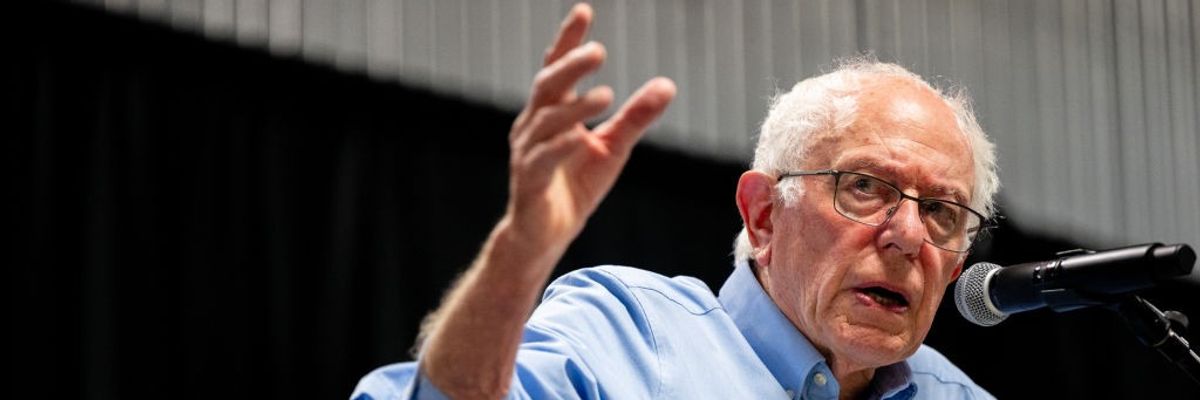Sanders Says There Is No Choice: 'We Must Defeat the Oligarchs'
The U.S. Senator from Vermont is asking big questions about how to achieve—even in the face of Trump's return—an "economy and government that works for all, not just the few."

U.S. Senator Bernie Sanders (I-Vt.) speaks on the second day of the Democratic National Convention (DNC) at the United Center in Chicago, Illinois, on August 20, 2024.
(Photo by Charly Triballeau/AFP)
Jon Queally
Nov 30, 2024
COMMON DREAMS
With the progressive movement in the United States still grappling with how best to respond to president-elect Donald Trump's victory earlier this month, Sen. Bernie Sanders issued a statement Saturday clarifying his belief that confronting the ruling oligarchy over the "coming months and years" will be the key battle for anyone who wants to build an economy and political system that puts the interests of everyday working people ahead of those of super-wealthy elites.
The Independent U.S. Senator from Vermont suggested Trump's victory was the direct result of a political economy largely controlled by the nation's richest individuals and powerful corporations and a situation in which massive wealth inequality has also created an incredible power imbalance.
"This is what Oligarchy looks like," Sanders said. "Today, while 60% of Americans live paycheck to paycheck, three multi-billionaires own more wealth than the bottom half of American society."
With a "greater concentration of ownership than we have seen since the Gilded Age," Sanders continued, from healthcare and financial services to the food, transportation, and housing sectors—"fewer and fewer giant corporations control what is produced and the prices we pay."
Nov 30, 2024
COMMON DREAMS
With the progressive movement in the United States still grappling with how best to respond to president-elect Donald Trump's victory earlier this month, Sen. Bernie Sanders issued a statement Saturday clarifying his belief that confronting the ruling oligarchy over the "coming months and years" will be the key battle for anyone who wants to build an economy and political system that puts the interests of everyday working people ahead of those of super-wealthy elites.
The Independent U.S. Senator from Vermont suggested Trump's victory was the direct result of a political economy largely controlled by the nation's richest individuals and powerful corporations and a situation in which massive wealth inequality has also created an incredible power imbalance.
"This is what Oligarchy looks like," Sanders said. "Today, while 60% of Americans live paycheck to paycheck, three multi-billionaires own more wealth than the bottom half of American society."
With a "greater concentration of ownership than we have seen since the Gilded Age," Sanders continued, from healthcare and financial services to the food, transportation, and housing sectors—"fewer and fewer giant corporations control what is produced and the prices we pay."
Sanders slammed a corporate media system in which corporate consolidation has led to an information and entertainment ecosystem in which an estimated "90% of U.S. media is controlled by just six huge global conglomerates," and a political system "increasingly controlled by the billionaire class" that is allowed to inject nearly limitless amounts of money into elections, most of it secretly and without accountability.
"In the recent elections," Sanders bemoaned, "just 150 billionaire families spent nearly $2 billion to get their candidates elected." Such a reality, he said, must be challenged.
"Our job in the coming months and years is clear. We must defeat the oligarchs and create an economy and government that works for all, not just the few."
How can such a defeat of these powerful forces be achieved? Sanders' latest statement did not reveal a prescription, but in a series of recent missives, social media posts, and interviews over the last week, the two-time presidential candidate has said that focusing on building working-class power is the key.
In a letter to supporters last week, Sanders said the question of "where do we go from here?" is a "very serious" one that demands deep scrutiny in the coming weeks and months. And he asked a series of more specific questions that he said must be addressed, including:How do we expand our efforts to build a multi-racial, multi-generational working-class movement?
How do we create a 50 state movement, not politics based on the electoral college and “battleground” states?
How do we deal with Citizens United and the ability of billionaires to buy elections?
How do we recruit more working-class candidates for office at all levels of government?
Should we be supporting Independent candidates who are prepared to take on both parties?
How do we better support union organizing?
How do we put together listening sessions around the country that intentionally seek input from people who did not vote for Democrats in the last election?
How do we best use social media to build our movement and combat the lies and disinformation coming from the billionaire class and right-wing media?
In a subsequent interview with The Nation, Sanders it is "absolutely" necessary to find ways to challenge both the Democratic Party and the Republican Party, both of which are dominated by corporate interests and wealthy donors.
"We just cannot sit back and accept candidates who are not prepared to stand up to Big Money interests and fight for the working class," Sanders said. "We cannot continue to do that. So, in one way or another, we have got to bring forth candidates who [will stand up to Big Money]."
Is Bernie Sanders Launching a Third Party? 'Not Right Now, No'
"Real change in this country will come about when an organized working class leads the fight for justice," the Vermont senator said in a new interview.

U.S. Sen. Bernie Sanders (I-Vt.) speaks at a rally on October 2, 2024 in Austin, Texas.
(Photo: Brandon Bell/Getty Images)
Jake Johnson
Nov 27, 2024
COMMON DREAMS
An email Sen. Bernie Sanders sent to supporters this past weekend fueled speculation that he could be laying the groundwork for a new political party in the wake of Democrats' crushing defeat in the 2024 election.
But in an interview with The Nation's John Nichols published Tuesday, Sanders (I-Vt.) said that he's not considering forming a party to challenge the entrenched Democratic and Republican establishments—at least not at the moment.
"Not right now, no," Sanders told Nichols, who asked the senator directly about his email to supporters and whether he intends to create a new party.
The senator argued in the email it is "highly unlikely" that the Democratic leadership will "learn the lessons of their defeat and create a party that stands with the working class and is prepared to take on the enormously powerful special interests that dominate our economy, our media, and our political life."
Sanders, who caucuses with the Democrats in the Senate, told Nichols that while he's not currently backing the creation of a new party, he is making the case that "where it is more advantageous to run as an Independent, outside of the Democratic primary process, we should do that." He also emphasized the need for more working-class candidates across the country.
"Real change in this country will come about when an organized working class leads the fight for justice. We need working-class candidates to help us do that."
The senator said the upstart campaign of Independent Dan Osborn—a union steamfitter who launched an unexpectedly close challenge to two-term Sen. Deb Fischer (R-Neb.) while shunning the state's Democratic establishment—"should be looked at as a model for the future."
"He took on both political parties," Sanders said of Osborn, who outperformed Vice President Kamala Harris by 14 percentage points in Nebraska and is now launching a PAC aimed at helping working-class candidates run for office.
"He took on the corporate world," Sanders continued. "He ran as a strong trade unionist. Without party support, getting heavily outspent, he got through to working-class people all over Nebraska. It was an extraordinary campaign, and it tells me that the American people are sick and tired of seeing the rich getting richer. They think billionaires dominate both political parties. They want real change, and Dan's campaign raised those issues in a very significant way."
Since Trump's victory earlier this month, Sanders has been scathing in his assessment of the current state of the Democratic Party and its long-term trajectory as it hemorrhages working-class support.
"The Democratic Party is, increasingly, a party dominated by billionaires, run by well-paid consultants whose ideology is to tinker around the edges of a grossly unjust and unfair oligarchic system," Sanders told Nichols. "If we are ever going to bring about real change in this country, we have got to significantly grow class consciousness in America."
In his email over the weekend, Sanders wrote that Democratic leaders "are much too wedded to the billionaires and corporate interests that fund their campaigns," making them reflexively hostile to the kinds of transformative changes needed to "build a multi-racial, multi-generational working class movement" with the power to challenge the nation's deeply unequal economic and political status quo.
"How do we recruit more working-class candidates for office at all levels of government? Should we be supporting Independent candidates who are prepared to take on both parties? How do we better support union organizing?" Sanders asked in the email. "These are some of the political questions that, together, we need to address. And it is absolutely critical that you make your voice heard during this process."
"Not me. Us," he added, reprising the central message of his 2020 campaign. "That is the only way forward."
No comments:
Post a Comment